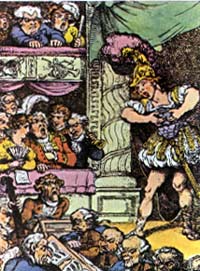 The three-act opera opens with Xerxes hearing the young Romilda singing on her terrace. His brother, Arsamene, also hears her and is provoked to jealousy for he is in love with Romilda. Arsamene wants to test Romilda's faithfulness to him so he hides when Xerxes invites Romilda to share his throne. She protests she cannot aspire to such giddy heights and, when Arsamene shows himself, Xerxes banishes him and goes off to Romilda to reproach her for spurning him. Romilda is determined to keep faith with Arsamene.
The three-act opera opens with Xerxes hearing the young Romilda singing on her terrace. His brother, Arsamene, also hears her and is provoked to jealousy for he is in love with Romilda. Arsamene wants to test Romilda's faithfulness to him so he hides when Xerxes invites Romilda to share his throne. She protests she cannot aspire to such giddy heights and, when Arsamene shows himself, Xerxes banishes him and goes off to Romilda to reproach her for spurning him. Romilda is determined to keep faith with Arsamene.
Amastre, who has previously been pledged to Xerxes in marriage, appears disguised as a soldier, and listens unseen while Xerxes longs to wed Romilda. Amastre is determined to get what is owed to her and discovers that while Xerxes loves Romilda, the lady does not return his affections.

Xerxes tells Arsamene that he can marry the woman he chooses on the day Xerxes gets married himself and informs Romilda for good measure that Arsamene does not love her. Alone, Xerxes reflects that life would be simpler if one could either love another person, or not, as one chooses. At the same time, Romilda is alone reflecting that someone who gives up in the face of difficulties does not know what true love is.
Arsamene and Romilda fight since Romilda is accusing him of writing love-letters to her sister. Arsamene and Romilda reconcile only to discover Xerxes' plans to marry Romilda. The lovers are desperate, saying farewell to each other: Arsamene will go wherever fate wills and Romilda to her death. But fate intervenes and the lovers eventually see the return of peace and joy, and the reconciliation of the requirements of love with those of honour.
Greek Battle of Salamis: Defeat of Persian King Xerxes by Themistocles
The Greek Victory of Salamis is on of the most stupendous moments of history, a battle which was to decide the fate of all the future ages. Greece overthrew Persia. Europe snatched from Asia that rulership of the world which Europe has held ever since. Asia had been the first home of all wealth and splendor and empire; but Asia had surrendered itself to the power of one man, the Persian tyrant Xerxes. His people were his servants, almost his slaves. Had he conquered the Greeks also, mankind might have continued slaves forever.
But the Greeks, though few in number, were free men and strong of soul, and they defied the tyrant. Xerxes sent his whole mighty navy to crush them. So sure was he of victory that he had a throne erected on the sea-shore in order that he might watch, like a theatrical performance, the downfall of the Greeks. He also brought with him the lords and ladies of his court to enjoy the spectacle. But the ships of the Greeks, with their sharp prows, crushed the Persian vessels. The Greeks said their gods fought for them, and that these visionary gods hovered in the air directing the strife, while priests offered sacrifice to them, and the Greek commander, Themistocles, stood above his men with folded arms, in triumph. Xerxes, in despair and fury, beholds the unforeseen destruction of his navy. He fled back to Persia, and shutting himself in his palace spent the rest of his life in idle pleasure. Never again did he appear in battle.
|

